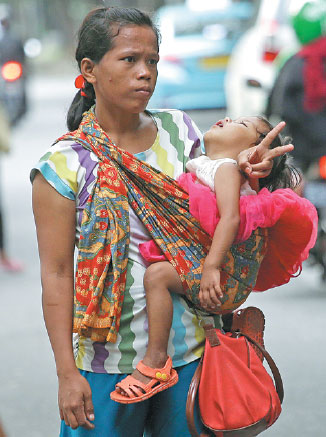Traffic clogged Jakarta to curb carpooling plan
Updated: 2016-04-05 08:13
By Associated Press in Jakarta, Indonesia(China Daily)
|
|||||||||
Lines of people from women holding babies to school age children, with a hand held up to show they're for hire, are a ubiquitous sight on the Indonesian capital's busiest roads during rush hour.
But not this week. Traffic-clogged Jakarta plans to suspend its peak-time rule of three people to one car from Tuesday. And the passengers for hire, known as jockeys, who helped drivers cheat the traffic controls, will be out of a job.
By lifting the 3-in-1 rule, city authorities will be testing what happens to congestion. If there's no difference to the number of cars on the road, they'll know that a system in place for more than a decade is broken.
Abandoning the policy will be bad news for the poor in a city where maddening traffic produces numerous novel ways to eke out a living. Apart from jockeys, there are self-appointed U-turn police and parking wardens who are tipped by drivers despite sometimes hindering more than helping.
"I want the authorities to extend the 3-in-1," said Muhammad Asmin, a 27-year-old who dropped out of school to become a jockey more than a decade ago to earn money for his family. "It is good for us, the poor, even if it's not working," said Asmin, who earns up to $15 a day by hopping in and out of cars.
Jakarta is the world's most congested city, according to a study of how often vehicles brake during a commute. Officials estimate Jakarta's traffic jams cause economic losses of about $3 billion a year.
The 3-in-1 rule was introduced in 2003 and the jockeys appeared soon after. Since then, the traffic has only gotten worse, mainly because more Indonesians can afford cars, which has overwhelmed a road network that has hardly grown. The carpooling policy has a particularly bad image since it's widely regarded as ineffective and also involves children, who take huge risks by getting into the vehicles of strangers.
Insufficient jobs
"We have been blamed for worsening the gridlock but the government didn't provide sufficient jobs for us," said Alfa Wahyudi, a 21-year-old who came to Jakarta from Borneo six months ago. "Don't blame our presence if the government is unable to provide us jobs."
The convenience of traveling on a 3-in-1 road is such that some drivers have arrangements with two or three regular jockeys.
Repeated crackdowns on the jockeys, who quickly scatter into side streets at the sight of police, failed to wipe out the profession. If caught, they are taken to a detention center for a couple of weeks and asked to sign a letter promising not to work as a jockey again. But many say they return to the roadside as soon as they can.
|
A woman signals to show that she's for hire as a "jockey" to help drivers cheat a peak time traffic rule of three people to one vehicle during rush hour, at the main business district in Jakarta, Indonesia, on Friday. Jakarta plans to suspend the rush hour traffic rule this week. Achamad Ibrahim / Associated Press |
(China Daily 04/05/2016 page10)
Today's Top News
Once-endangered pony makes comeback
Bookshop worms way into community
A fresh start
Bookshops reinvent themselves
Xi-Obama bilateral talk to advance ties
Foreign companies reassured on new Internet rules
Beijing and Prague form new key link
Trump drops pledge to back Republican nominee
Hot Topics
Lunar probe , China growth forecasts, Emission rules get tougher, China seen through 'colored lens', International board,
Editor's Picks

|

|

|

|

|

|







